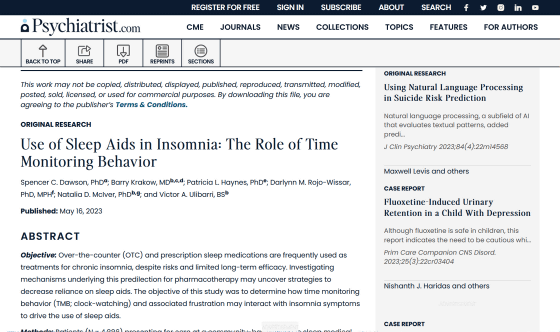Research results that insomnia will get worse if you worry too much about ``what time is it now?'' on a sleepless night

Some people who suffer from
Use of Sleep Aids in Insomnia: The Role of Time Monitoring Behavior |
https://doi.org/10.4088/PCC.22m03344

Losing sleep over losing sleep: How watching the clock impacts insomnia, use of sleep aids: IU News
https://news.iu.edu/live/news/28256-losing-sleep-over-losing-sleep-how-watching-the-clock-
Doing This One Thing Makes Insomnia Even Worse, Psychologists Warn : ScienceAlert
https://www.sciencealert.com/doing-this-one-thing-makes-insomnia-even-worse-psychologists-warn
According to the Ministry of Health, Labor and Welfare, 30 to 40% of general adults have some insomnia symptoms, and about 10% suffer from chronic insomnia. Insomnia is associated with health problems such as depression and cardiovascular disease, so research leading to the elimination of insomnia is very important.
Of course, the person suffering from insomnia should want to go to sleep early, but the behavior of frequently looking at the clock to check the time (time-monitoring behavior: TMB) increases frustration and induces insomnia. It can make it worse or increase the amount of sleeping pills used.
Therefore, a research team led by Spencer Dawson , a clinical psychologist at Indiana University, analyzed data from 4886 patients who responded to a questionnaire at the Sleep Medicine Center in Arizona. Then, we analyzed 'severity of insomnia', 'time spent on TMB when trying to sleep', and 'dosage of sleep inducers'.

As a result of the analysis, a strong relationship was found for three variables: ``severity of insomnia'', ``time spent on TMB when trying to sleep'', and ``amount of sleep inducer used''. People with insomnia and related psychiatric conditions reported more TMB and sleep-inducing drug use.
When the research team asked subjects about the frustration caused by TMB and itself, they found an association between the frustration caused by TMB and the use of sleep-inducing drugs. This provides evidence for the hypothesis that the resulting frustration of TMB exacerbates insomnia and promotes the use of sleep-inducing drugs.
``People worry about not getting enough sleep and start calculating how long it takes to fall asleep and wake up,'' Dawson said. increase. He advised people who suffer from insomnia to avoid checking the time by hiding their watches and keeping their smartphones away while they sleep.

Related Posts:
in Science, Posted by log1h_ik






